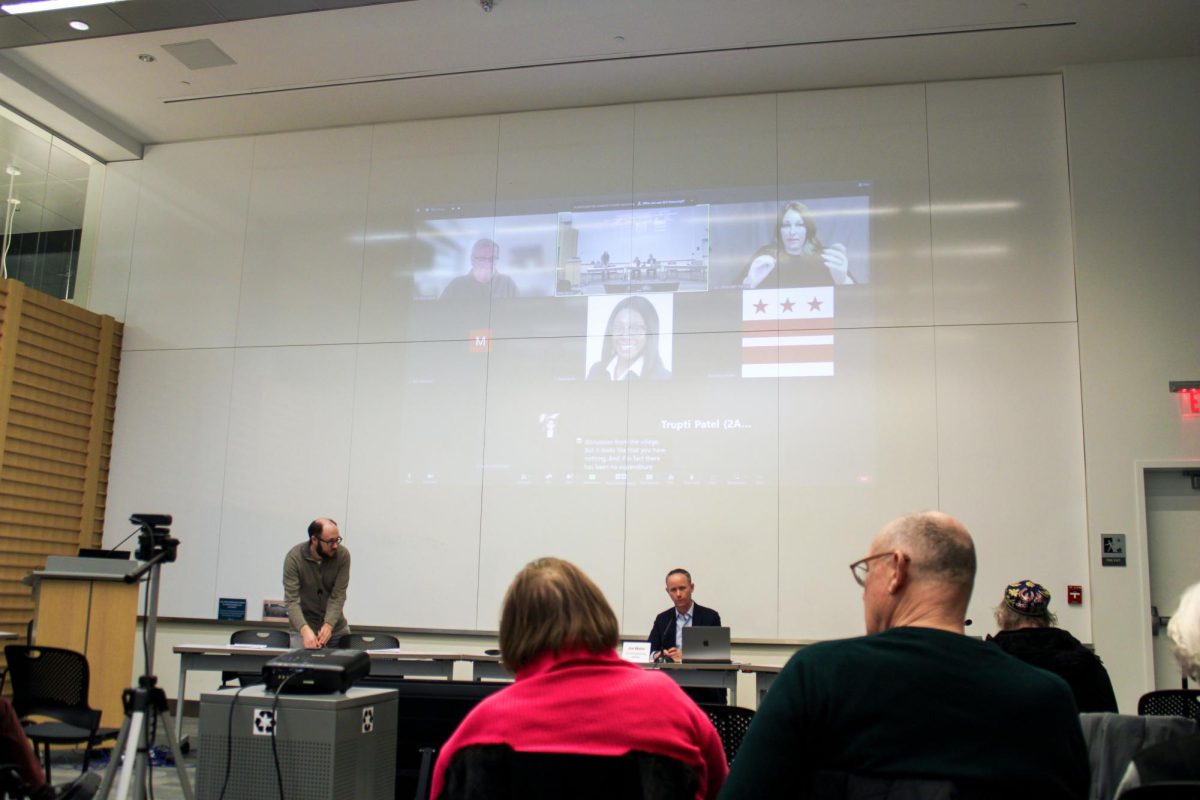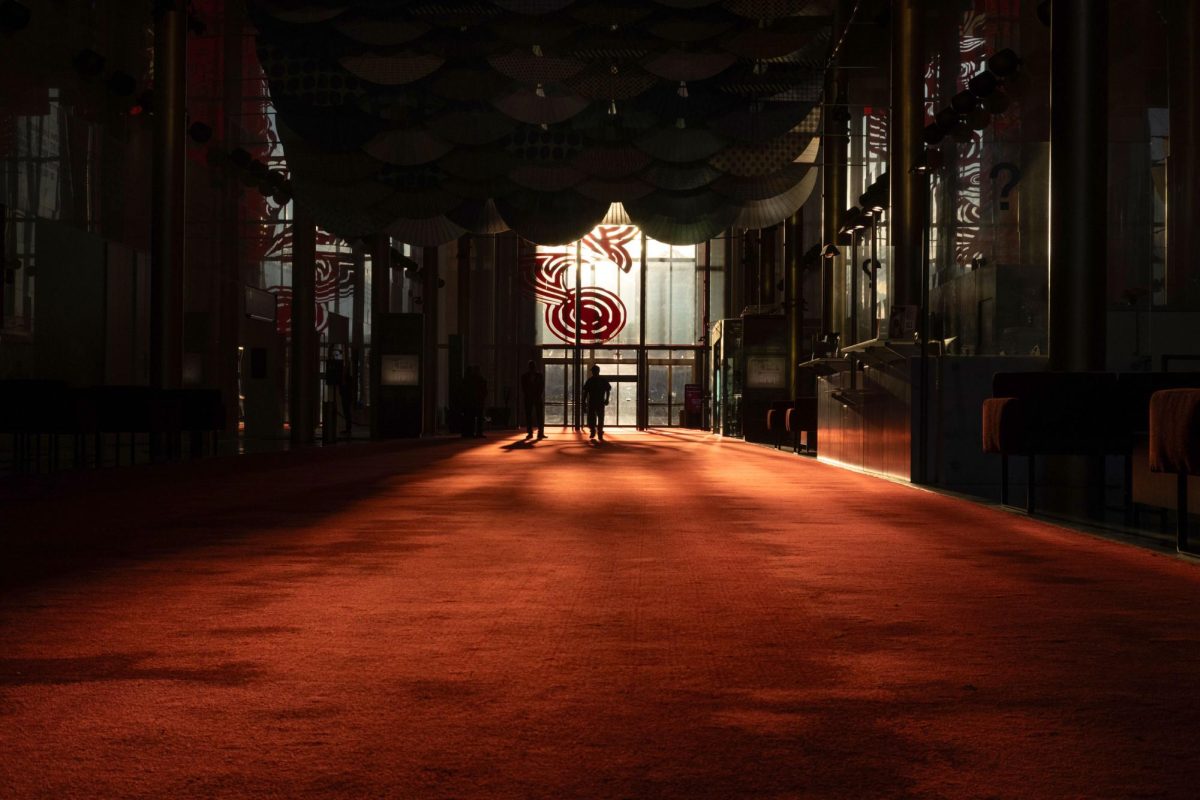Officials will delay the opening of a homeless shelter at The Aston after an unnamed group of local property owners filed a second lawsuit last month attempting to block its conversion into a shelter.
Department of Human Services Chief of Staff David Ross said at a Wednesday Foggy Bottom and West End Advisory Neighborhood Commission meeting that officials are delaying the conversion of The Aston — a former GW residence hall — into a shelter for unhoused, medically vulnerable people, which was initially projected to accept residents this month. Ross said the shelter will begin admitting clients in the spring or summer of 2024 due to extended time spent finding a provider for the future clients, the impending lawsuit from the unnamed neighbors and an unclear construction timeline.
Commissioners also passed their budget for fiscal year 2024 and passed five resolutions relating to D.C. Council bills.
Here are some of the meeting’s highlights:
DHS officials provide updates, field questions from commissioners on Aston conversion
DHS officials said Aston renovations are underway, including painting, replacing carpet and deep cleaning.
David Ross said DHS is up to six months behind schedule on opening the shelter following its conversion from a GW residence hall. He said DHS is still in contract negotiations to select a provider to oversee case management and building operations.
Ross said the provider will have approximately 60 days to onboard and become oriented with the building once renovations are completed.
Ross said DHS, the Executive Office of the Mayor and the Department of General Services have selected their representatives to the Community Advisory Team, a group that will work with District officials and members of the ANC to oversee The Aston’s conversion, but he did not disclose who they were. The June proposed plan allotted one Community Advisory Team representative for each body.
“Our goal was to ensure that the slots were filled,” Ross said.
The ANC elected Courtney Cooperman, a housing advocacy adviser for the National Low Income Housing Coalition, and Chris Labas, the property manager of the condominium West End Place, to the Community Advisory Team last week.
DHS Deputy Administrator for Individuals Family Services Anthony Newman said the proposed shelter in The Aston “is not a nursing home group,” and clients will be fully self-sufficient save for temporary medical issues.
The West End D.C. Community Association — a group of anonymous locals “within very close proximity” of The Aston property in West End — filed a new lawsuit late last month, alleging the District cannot build a medical clinic in The Aston due to zoning constraints. The group withdrew a near-identical lawsuit in August, which allowed the D.C. government to purchase The Aston from GW for $27 million shortly after.
Scott Morrison, the attorney representing the unnamed group in the lawsuit, told The Wash, a graduate student publication at American University, that his clients believe the shelter will lead to an increase in crime, drawing tourists away from nearby businesses. He said the D.C. government should construct the proposed shelter in Georgetown or elsewhere in the District.
“You’re not only going to have all those residents but you’re also going to have all the homeless people that congregate around homeless shelters,” Morrison told the Wash. “It’s a very affluent area.”
Commissioners approve fiscal year 2024 budget
Commissioners voted 5-0-3 to approve ANC 2A’s FY2024 budget. 2A06 Commissioner Joel Causey and 2A09 Evelyn Hudson did not attend the meeting. 2A08 Commissioner Jordan Nassar arrived late.
Commissioners approved a $24,777 budget for FY2024, a $321 increase from the $24,456 FY2023 budget. The budget includes $15,104 in personal disbursements, $7,000 in purchases of service disbursements and $1,000 in communication disbursements.
Peter Sacco, the executive director of ANCs 2A, 2B and 2E, said the $7,000 in purchases of service disbursements can be used for retention of counsel and hiring of consultants. He said commissioners can vote to raise the budget for purchases of services if needed.
“It’s not really set in stone because oftentimes what happens if we decide to go down that route, the cost could end up being much higher than what is the $7,000,” Sacco said.
Commissioners pass five resolutions related to D.C. Council
Commissioners unanimously approved a resolution supporting the Local Rent Supplement Program Eligibility Amendment Act of 2023, which would prohibit the D.C. Housing Authority from requesting applicants for housing vouchers to disclose their immigration statuses, any prior criminal arrests, convictions or pending cases.
2A03 Commissioner Trupti Patel first proposed the resolution in July, and it was sidelined because of a lack of quorum and time constraints until Wednesday’s meeting. The D.C. Council referred the bill to the Housing Committee in February and held a public hearing in June, but it has not undergone readings in committee.
Commissioners also unanimously approved a resolution in support of the Rent Stabilization Protection Amendment Act of 2023, which requires the Housing Authority follow “rent stabilization laws” during rent calculations for tenants using housing vouchers. Patel also proposed the resolution in July.
The D.C. Council referred the bill to the Housing Committee and held a public hearing, but it has not undergone readings in committee.
Commissioners voted 4-2-2 — with 2A04 Commissioner Ed Comer and 2A08 Commissioner Jordan Nassar in opposition — to pass a resolution supporting the Sexual Harassment Investigation Integrity Amendment Act of 2023, which requires sexual harassment investigations against executive branch employees “in positions of power” be referred to independent investigators. The bill follows a District investigation into D.C. Mayor Muriel Bowser’s top adviser, John Falcicchio, who allegedly used his position to sexually harass multiple D.C. government employees.
Patel also proposed the resolution in July. A public hearing for the bill is scheduled for Dec. 6.
Commissioners also voted 4-2-2, with Comer and Nassar in opposition, to support the Reparations Foundation Fund and Task Force Establishment Act of 2023. The bill would establish a task force to create reparation proposals in response to slavery, segregation policies and institutional racism.
Patel also submitted the resolution in July. The D.C. Council referred the bill to the Business and Economic Development Committee and held a public hearing on June 15, but the Council has not yet read the bill in committee.
Commissioners voted 4-2-2, with Comer and Nassar abstaining, to support the Addressing Crime through Targeted Interventions and Violence Enforcement Amendment Act of 2023. The bill would increase the maximum penalty for individuals firing five or more bullets during one incident to 10 years, an increase from the five years for more minor offenses.
The D.C. Council referred the bill to the Judiciary and Public Safety Committee in October and held a public hearing in November but has not yet begun reading the bill in committee.
Commissioners tacitly approve parking removal on 20th Street
Commissioners did not consider the D.C. Department of Transportation’s notice of intent that it will remove parking on the west side of 20th Street north of K Street to improve the visibility of cyclists for southbound drivers. Sacco said DDOT will take the ANC’s non-response to the notice of intent as a “tacit approval.”
Commissioners deny resolutions relating to Bindaas’ application for increased outdoor seating
Commissioners denied two resolutions that would have allowed Bindaas to increase its number of outdoor tables after tabling the eatery’s public space application during an October meeting. Commissioners said they were dissatisfied with Bindaas counsel Cameron Mixon’s answers to questions on whether the increase would allow for people with disabilities to pass by on the narrow street.
Commissioners unanimously voted to cancel their December meeting and plan to next meet in January. ANC 2A Chair Jim Malec said the ANC will likely not be able to reach quorum, and members of the public tend to be busier during the month, but the ANC can still call a special meeting in December if needed.




